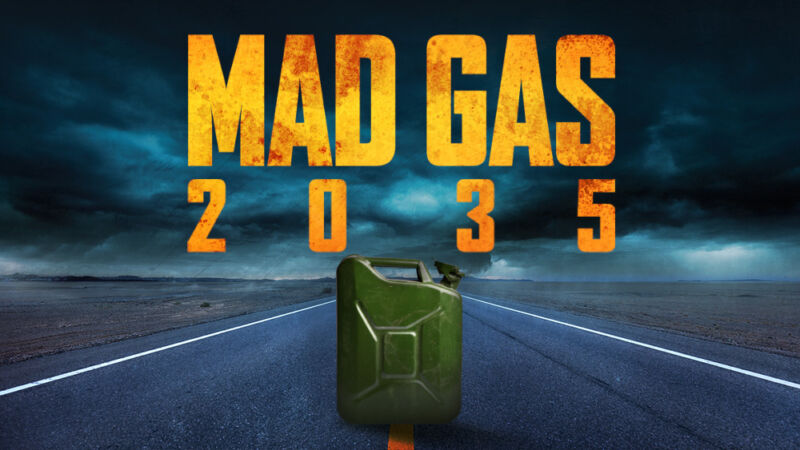

California calls time on internal combustion engines from 2035
source link: https://arstechnica.com/cars/2022/08/california-calls-time-on-internal-combustion-engines-from-2035/
Go to the source link to view the article. You can view the picture content, updated content and better typesetting reading experience. If the link is broken, please click the button below to view the snapshot at that time.

leading the way —
California calls time on internal combustion engines from 2035
In the face of federal inaction, the Golden State acts.
Jonathan M. Gitlin - 8/25/2022, 2:06 PM

On Thursday when the California Air Resources Board gathers for its monthly meeting, it's widely expected it will approve a ban on new vehicles with internal combustion engines, set to go into effect in 2035. The state has been a leader in accelerating the transition to clean transportation, and this latest move continues that trend.
In fact, the proposed ban on new gasoline or diesel engines has been in the works for some time; just under two years ago, California Governor Gavin Newsom signed an executive order requiring that from 2035, all new passenger cars and light trucks be zero-emissions.
Around the world, cities and countries are starting to plan for the end of the internal combustion engine. Paris, Madrid, Athens, and Mexico City have announced plans to ban the sale of new fossil fuel-powered vehicles in the next three years—a target that might be somewhat ambitious post-pandemic.
National bans on new ICE vehicles have been mooted for the United Kingdom and Germany by 2030 and France by 2040.
Meanwhile, US President Joe Biden announced an ambition that 50 percent of all new vehicles sold in the US in 2035 be zero-emissions, although the odds of that coming to pass—already slim—will likely be significantly hampered by the Inflation Reduction Act, which President Biden signed into law last week.
Despite—or perhaps because of—decades of lackluster action by the federal government when it comes to reducing transport emissions, as the nation's largest market for new vehicles, California has been able to force automakers to improve the efficiency and reduce the carbon footprint of its products if they want access to its residents.
AdvertisementPerhaps surprisingly, the automakers appear to support the new mandate—although perhaps it's to be expected given how many are restructuring their businesses to electrify over the next decade.
"At Ford, combatting climate change is a strategic priority, and we're proud of our partnership with California for stronger vehicle emissions standards, forged during a time when climate action was under attack. We're committed to building a zero-emissions transportation future that includes everyone, backed by our own investments of more than $50 billion by 2026 in EVs and batteries. The CARB Advanced Clean Cars II rule is a landmark standard that will define clean transportation and set an example for the United States," said Ford's chief sustainability officer, Bob Holycross.
Even Toyota, which has donated significant funds to Republican politicians to water down fuel efficiency standards, sounded broadly positive about the ban.
"Toyota continues to share the vision of GHG reduction and carbon neutrality goals with CARB and the State. In our recent communication, we acknowledged CARB’s leadership in climate policies and its authority to set vehicle emissions standards under the Clean Air Act. We are also excited about our efforts to extend zero-emissions activities beyond our core vehicle business with our "Clean Ports, Clean Corridors and Clean Communities" initiative, and we're eager to explore the State's engagement with these efforts," it said in a statement.
However, any putative California ban may have to reckon with a future Republican government. The previous administration fought tooth and nail to allow automakers to pollute, seeking to nullify California's legal authority to regulate its own air quality. Many of those restrictions have been rolled back this year, thankfully.
Promoted Comments
-
@bedub1Quote:Lol their power grid sucks so much they have brownouts every summer. They can't support charging that many electric cars.This is a common misconception that EVs will somehow overload the grid.
I’m going to use TX as an example with its own incredibly bad grid that’s been on the verge of brown outs multiple times this summer to demonstrate as I’m more familiar with ERCOTS published graphs.
Here’s the demand and supply curves from ERCOT for today.If you notice there is a rough delta of about 8GW from midnight and 8:00AM between the demand line and committed supply. Power companies actually don’t like this and would rather have a more constant demand which is why many of them offer discounted power for nights and weekends.
Most EV owners charge at night so for those 8 hours how many EVs could be recharged without adding a single power plant?
8GW x 8 hours = 64million kWh.
A Tesla M3 LR gets about 4 miles / kWh while an F150 Lightning gets about 2 miles/kWh so let’s call 3miles /kWh a good average.
That 64M kWh equals about 192M miles of range.
For Texans who drive on average 45 miles/day that’s enough to recharge an additional 4.2M EVs every night
If we assume the CA power grid also keeps about an 8GW delta over night and the average CA resident drives 35 miles / day that’s an additional 5.6M EVs
There are roughly 14M cars in CA and about 560,000 EVs on the road all ready. So CA can increase that number 10X to ~ 6.1M EVs or 45% of all cars before they have to change anything with the grid.
The real problem short term is increasing the number of level 2 chargers for homeowners and apartment renters. At the grid level they have plenty of time for expansion.
Recommend
About Joyk
Aggregate valuable and interesting links.
Joyk means Joy of geeK